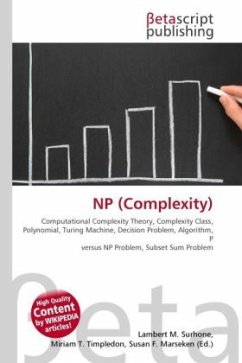
Weakly NP-Complete
Versandkostenfrei!
Versandfertig in 6-10 Tagen
23,99 €
inkl. MwSt.

PAYBACK Punkte
12 °P sammeln!
High Quality Content by WIKIPEDIA articles! In computational complexity, an NP-complete (or NP-hard) problem is weakly NP-complete (or weakly NP-hard), if there is an algorithm for the problem whose running time is polynomial in the dimension of the problem and the magnitudes of the data involved (provided these are given as integers), rather than the base-two logarithms of their magnitudes. Such algorithms are technically exponential functions of their input size and are therefore not considered polynomial. For example, the NP-hard knapsack problem can be solved by a dynamic programming algor...
High Quality Content by WIKIPEDIA articles! In computational complexity, an NP-complete (or NP-hard) problem is weakly NP-complete (or weakly NP-hard), if there is an algorithm for the problem whose running time is polynomial in the dimension of the problem and the magnitudes of the data involved (provided these are given as integers), rather than the base-two logarithms of their magnitudes. Such algorithms are technically exponential functions of their input size and are therefore not considered polynomial. For example, the NP-hard knapsack problem can be solved by a dynamic programming algorithm requiring a number of steps polynomial in the size of the knapsack and the number of items (assuming that all data are scaled to be integers). This algorithm is exponential time since the input sizes of the objects and knapsack are logarithmic in their magnitudes.












